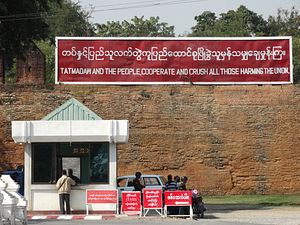Outrage is mounting at Burma for atrocities committed in the last month in the northern part of the country’s western Rakhine State. Horrific abuses have resulted in the displacement of nearly a half million ethnic Rohingya Muslims and the burning of at least 150 villages. Refugees have made credible allegations of rapes and even massacres.
It would be a mistake, however, to focus criticism primarily on Burma’s de facto leader, Aung San Suu Kyi, disappointing as she has been in responding to the crisis. She and other government officials have largely denied — and are still denying — allegations of atrocities, calling them fabrications. In early September, Aung San Suu Kyi spoke of an “iceberg of misinformation” about abuses, and in a speech on September 19 appeared alarmingly ignorant of the overall situation, noting at one point: “We want to find out why this exodus is happening.”
The Burmese government is ultimately responsible for dealing with the Rohingya crisis, but it is Burma’s military leaders who are in charge of the forces committing the abuses, and are in the best position to end them. In debating next steps on the Rohingya crisis, concerned governments need to focus primarily on the military, and consider what measures might best impact its behavior.
In this regard, one thing is clear: condemnations and pleas are not enough. Burma’s military leaders are in a state of denial — or worse. The commander-in-chief of the military, Sr. Gen. Min Aung Hlaing, recently made statements suggesting that the Rohingya do not even exist, that Burma’s Rohingya population are in fact “Bengali,” and that ongoing military operations are aimed at “unfinished business” from the Second World War.
These are divisive, unsupported allegations that the Rohingya, despite living in the country for generations, are not Burmese citizens. They are clear allusions to mass killings of Rohingya that occurred in 1942 and are reflected in the killings and arson that have occurred in recent years.
In another speech on September 21, Min Aung Hlaing essentially embraced that the campaign had comprised ethnic cleansing, referring to “national races,” a term from Burmese law referring to a list of officially recognized indigenous ethnic groups — a list that does not include Rohingya. “Regarding the rehabilitation of villages of our national races, for the national races who fled their homes [mostly ethnic Rakhine Buddhists], first of all they must go back to their places,” he said. “The important thing is to have our people in the region. It’s necessary to have control of our region with our national races. We can’t do anything if there are no people from our national races . . . that is their rightful place.”
These comments reveal that Burma’s military leaders are not communicating on the same wavelength as the rest of the international community. They are not prepared to appreciate or even hear its verbal denunciations and demands. So the time has come to impose hard costs on them — targeted sanctions and other punishments—that bring real world practical or financial harm to Burma’s senior military command. It may be impossible to convince the military leadership to care about the Rohingya, but it might be possible to stop them from killing or displacing any more Rohingya — if the consequences of not doing so impose a burden that military leaders don’t want to bear.
The United Nations Security Council, and concerned member states bilaterally, need to impose targeted sanctions on Burmese military leaders and key military-owned enterprises, including travel bans and restrictions on access to financial institutions, and impose a comprehensive military embargo. In many countries, a sanctions framework is already in place, and it was not that long ago that targeted sanctions were lifted in recognition of the country’s efforts to transition to democracy.
The Security Council should also insist that persons responsible for grave human rights violations be held accountable for their crimes, and press Burmese authorities to cooperate with the UN fact-finding mission established by the UN Human Rights Council and grant unfettered access to its staff to Rakhine State. The council should send a clear message that it stands ready to take additional steps to ensure justice including through the International Criminal Court, and urge member states to pursue other mechanisms that might provide justice for recent abuses.
These measures are not merely meant to deter more atrocities. Sanctions should be glued to demands that the international community has made, setting them as benchmarks the Burmese military needs to meet for sanctions to be relaxed: stopping abuses, allowing refugees to return, allowing access by journalists and the UN Fact-Finding Mission, allowing humanitarian access to people in need, and prosecuting perpetrators of abuses. Prior to the recent crisis, the Burmese government has already pledged to take other steps laid out in the recommendations of the recent Advisory Commission on Rakhine State led by Kofi Annan; the military’s cooperation on that should be another benchmark.
Concerned governments shouldn’t wait for the United Nations to act, however. Key countries like the United States, EU member states, Australia, Canada, and regional states in Southeast Asia, should impose or re-impose their own bilateral sanctions on military commanders and military-owned enterprises, and expand existing arms embargoes to include all maintenance, assistance, training and cooperation with the Burmese army. The Trump administration should place senior military leaders and key military-owned enterprises on the “Specially Designated Nationals” list that restricts travel to the US and access to US companies and financial institutions. The European Union and its member states should renew their versions of the same restrictions.
For those who worry that tough responses may worsen the situation or weaken the international community’s influence, one could ask: What influence? And how much worse can things get? What is the alternative plan for compelling the military to stop abuses?
It’s time to get tough with Burma’s generals. Words are not enough.
John Sifton is Asia advocacy director at Human Rights Watch.
































